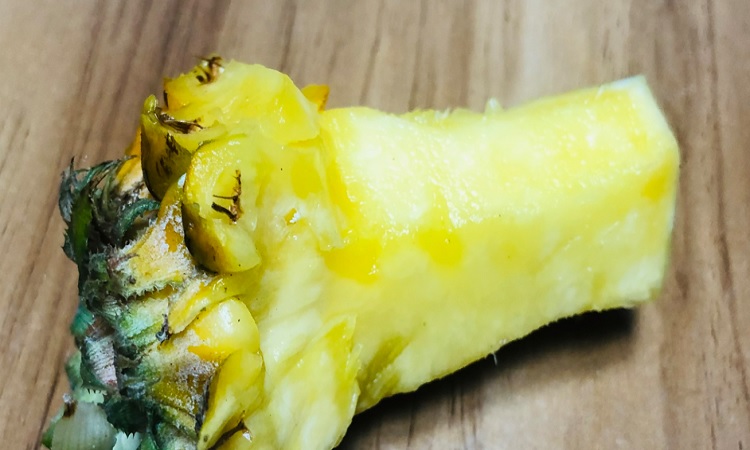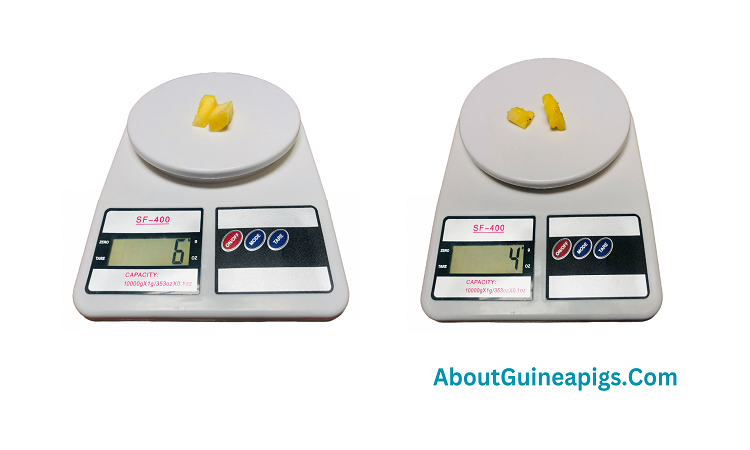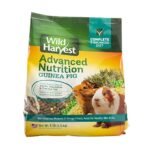Do guinea pigs eat pineapple core? Obviously, it is a good question. Because as an owner of pets like guinea pigs, I should introduce themself to different types of diets, food, and treats. Whatever, different types of food can provide different health benefits.
Guinea pigs, known for their herbivorous diet, primarily feed on hay, vegetables, and fruits. While their nutritional needs are fairly specific, the question arises as to whether guinea pigs can enjoy the sweet tropical delight of pineapple core.
In this below article, i explore the compatibility of guinea pigs with pineapple core, shedding light on its potential benefits, potential risks, and overall suitability as a dietary addition for these adorable rodents.
Contents
- Benefits of Pineapple Core for Guinea Pigs
- Potential Risks of Pineapple Core for Guinea Pigs
- Do Guinea Pigs Eat Pineapple Core (Exploring Guinea Pig’s Preference for Pineapple Core)
- Considerations Before Offering Pineapple Core to Guinea Pigs
- Moderation of the Experiment
- Warning Before Introducing Pineapple Core
- My Opinion
Benefits of Pineapple Core for Guinea Pigs

Pineapple is a tropical fruit renowned for its unique flavor and high vitamin C content. The core, often discarded by humans, contains a range of essential nutrients and offers potential benefits to guinea pigs when consumed in moderation.
Guinea pigs, like humans, lack the ability to synthesize vitamin C, making it necessary for their diet. Pineapple core is rich in vitamin C, providing a natural source of this vital nutrient that aids in maintaining their overall health, particularly the development of healthy connective tissues.
Pineapple core, although not a typical part of a guinea pig’s diet, pineapple core can offer some potential benefits when fed in moderation. Here are a few potential benefits of pineapple core for guinea pigs:
Vitamin C:
Guinea pigs, like humans, cannot synthesize vitamin C and must obtain it from their diet. Pineapple core is a good source of vitamin C, which is essential for guinea pigs as it supports their immune system and aids in the development of healthy connective tissues.
Fiber:
Fiber plays a crucial role in the digestive health of guinea pigs, aiding in proper gut motility and preventing issues like diarrhea and gastrointestinal stasis.
While the pineapple core is not as fibrous as its main dietary components, like hay and vegetables, it still contains a reasonable amount of dietary fiber.
Fiber is important for maintaining healthy digestion and preventing gastrointestinal issues such as diarrhea and constipation in guinea pigs. When offered in moderation, pineapple core can contribute to a balanced diet by supplementing the guinea pig’s fiber intake.
Enzymes:
Pineapple core contains an enzyme called bromelain, which has been suggested to have anti-inflammatory properties.
However, it’s important to note that the bromelain content in pineapple core is relatively low, and more research is needed to determine its potential benefits for guinea pigs specifically.
Variety and Enrichment:
Introducing small amounts of pineapple core can add variety to a guinea pig’s diet and give them a different taste experience.
Different textures and flavors can help prevent boredom and provide mental stimulation for these intelligent and curious animals.
You should remember that pineapple core should only be fed as an occasional treat and in moderation is crucial.
Potential Risks of Pineapple Core for Guinea Pigs
While pineapple core can provide specific benefits for guinea pigs when fed in moderation, there are potential risks that should be considered.
Below I have discussed some potential dangers of pineapple core for guinea pigs:
High Sugar Content:
Pineapple core contains natural sugars, which can harm guinea pigs if consumed excessively.
Guinea pigs are prone to weight gain and can develop obesity, dental issues, and digestive problems when their diet is high in sugar.
Excessive sugar intake can disrupt their gut flora and lead to gastrointestinal issues like diarrhea and bloating.
Digestive Upset:
Guinea pigs have sensitive digestive systems, and introducing new foods can cause digestive upset.
The enzymes present in pineapple, such as bromelain, can be harsh on the guinea pig’s delicate digestive system. This may result in gastrointestinal disturbances, including diarrhea and stomach discomfort.
Allergies and Sensitivities:
While rare, some guinea pigs may have allergies or sensitivities to the pineapple core or its components.
Allergic reactions can manifest as skin rashes, itching, swelling, respiratory issues, or gastrointestinal problems.
If any signs of an allergic reaction are observed, it is essential to discontinue feeding pineapple core and consult a veterinarian.
Dental Issues:
Guinea pigs have continuously growing teeth that require proper wear through chewing on fibrous foods like hay.
The texture of the pineapple core is relatively soft, and its consumption may not provide the necessary chewing action to maintain dental health.
Excessive consumption of pineapple core without adequate dental wear can lead to overgrown teeth, pain, and difficulty eating.
Disruption of Balanced Diet:
Guinea pigs have specific dietary requirements that need to be met to maintain optimal health.
While pineapple core can offer certain nutrients, it should not replace their primary diet of hay, fresh vegetables, and limited amounts of fruits.
Feeding too much pineapple core can lead to an imbalanced diet, depriving guinea pigs of other essential nutrients.
[su_note note_color=”#f4ff96″ text_color=”#333333″ radius=”3″ class=””]Note: To ensure the well-being of your guinea pigs, it is crucial to introduce pineapple core in small amounts and monitor their response closely. If any adverse reactions occur, such as digestive issues, changes in stool consistency, or signs of discomfort, it is best to discontinue offering pineapple core and consult a veterinarian for further guidance. A balanced and varied diet, along with regular veterinary check-ups, is essential for the overall health of guinea pigs.[/su_note]
Do Guinea Pigs Eat Pineapple Core (Exploring Guinea Pig’s Preference for Pineapple Core)
In the quest to understand the dietary preferences of guinea pigs, an experiment was conducted to investigate whether they consume pineapple cores.
The experiment involved offering 6 grams of pineapple core to two guinea pigs named Max and Maya.
This article describes the experiment’s methodology, discusses the findings, and analyzes the results obtained.
You can also watch my video to understand their behavior during eating pineapple core.
Methodology:
To conduct the experiment, 6 grams of pineapple core were carefully prepared by removing the outer skin and any eyes. The core was then cut into small, bite-sized pieces to facilitate consumption by the guinea pigs.
The prepared pineapple core was offered to Max and Maya in separate bowls, allowing them unrestricted access to it for a specific period. Their consumption of the pineapple core was closely observed and measured.
Pineapple Core Consumed Report
|
Descriptions |
Amounts To Eat (Max & Maya) |
|
Was Given To Eat |
6 Gram |
|
They Ate |
2 Gram |
|
Percent Ate |
33.33% |
|
Remains |
4 Gram |

Findings:
Upon the presentation of the pineapple core, Max and Maya displayed interest and began consuming it.
The experiment revealed that Max consumed 1 gram of pineapple core, while Maya consumed 1 gram. Thus, the total consumption by both guinea pigs amounted to 2 grams of pineapple core.
The results indicate that Max and Maya consumed approximately 33.33% of the offered pineapple core.
Notably, the guinea pigs demonstrated an inclination towards consuming the pineapple core, albeit in relatively small quantities.
While the experiment’s findings suggest that guinea pigs have a moderate preference for pineapple core, it is crucial to interpret the results within the context of their overall dietary requirements and preferences.
Discussion and Analyzing:
The experiment’s results provide insight into guinea pig’s response to pineapple core. Although Max and Maya consumed only a fraction of the offered pineapple core, their interest and consumption demonstrate a certain level of acceptance for this tropical fruit component.
Guinea pigs, being herbivores, typically thrive on a diet rich in hay, vegetables, and fruits. Pineapple core, despite not being a common part of their regular diet, can be considered an occasional addition.
Max and Maya’s relatively low consumption of pineapple core could be attributed to several factors. Guinea pigs have specific nutritional requirements, and their dietary preferences can vary.
Additionally, the natural sugars present in pineapple core may limit their consumption due to potential weight gain and digestive issues. Moreover, guinea pigs are creatures of habit and may take time to adjust to new foods, including pineapple core.
Considerations Before Offering Pineapple Core to Guinea Pigs
Before offering pineapple core to your guinea pigs, it is important to consider the following factors:
Moderation:
While pineapple core can provide certain benefits, it should be offered in moderation. Guinea pigs have specific dietary requirements, and their digestive systems are sensitive.
Excessive consumption of pineapple core, or any sugary food, can lead to weight gain, digestive issues, and potential health problems. It is recommended to offer small portions of pineapple core as an occasional treat rather than a regular part of their diet.
Sugar Content:
Pineapple core contains natural sugars, which can be harmful if consumed in large quantities. Guinea pigs are prone to weight gain and can develop dental issues if their diet is high in sugar.
Therefore, it is essential to monitor the serving size and frequency of pineapple core to prevent these problems. Always remember that the overall diet of guinea pigs should primarily consist of hay, fresh vegetables, and limited amounts of fruit.
Digestive Sensitivity:
Guinea pigs have delicate digestive systems, and introducing new foods can potentially cause digestive upset.
When offering pineapple core for the first time, observe your guinea pigs closely for any signs of discomfort, such as diarrhea, bloating, or changes in their eating habits.
If any adverse reactions occur, it is best to discontinue offering pineapple core and consult with a veterinarian for further guidance.
Preparation and Serving Size:
Before offering pineapple core to your guinea pigs, ensure that you have properly prepared it. Remove the tough outer skin and any eyes (hard, dark spots) to make it easier for them to chew and digest.
Cut the core into small, bite-sized pieces that are manageable for your guinea pigs. Start with a small portion, such as a quarter or half a teaspoon, and observe their response.
If they enjoy it and tolerate it well, you can continue offering pineapple core in small portions occasionally.
Individual Preferences:
It’s important to remember that each guinea pig is unique and may have different preferences when it comes to food. While some guinea pigs may enjoy pineapple core, others may not show interest or may have adverse reactions.
Pay attention to your guinea pig’s preferences and responses to ensure their well-being and enjoyment of their diet.
In any case, it is always recommended to consult with a veterinarian for personalized advice regarding your guinea pig’s diet and specific nutritional needs.
They can provide guidance based on your guinea pig’s overall health, age, and individual requirements, helping you make informed decisions about introducing new foods like pineapple core and pineapple skin.
Moderation of the Experiment
In the experiment mentioned, where Max and Maya consumed 2 grams of pineapple core out of the 6 grams offered, they consumed approximately 33.33% of the core.
While this indicates their interest in the fruit, it is crucial to note that each guinea pig’s dietary requirements and preferences may vary.
Introducing any new food gradually and observing the guinea pig’s response is always recommended.
A small serving, like the one provided in the experiment, appears to be within a safe range. Still, you must consult a veterinarian for personalized advice based on your guinea pig’s specific needs.
Warning Before Introducing Pineapple Core
When introducing pineapple core to guinea pigs, removing the outer prickly skin and any eyes (hard, dark spots) from the fruit is important.
Cut the core into small, bite-sized pieces, ensuring they are easy for the guinea pigs to chew and swallow.
Start with a small serving, such as a quarter or half a teaspoon, and monitor their reaction closely.
If they exhibit any signs of digestive discomfort or refuse to eat it, it is best to discontinue offering pineapple core and explore other safe options.
My Opinion
In the last word, I like to say that, guinea pigs can consume pineapple core as part of their well-balanced diet, provided it is introduced in moderation and with caution.
The core contains valuable nutrients, including vitamin C, and can contribute to the guinea pig’s fiber intake.
However, it is crucial to keep the sugar content in mind and monitor the guinea pig’s reaction to ensure it suits their needs.
Always consult a veterinarian for guidance regarding your guinea pig’s diet and nutritional requirements, ensuring their health and well-being are always prioritized.
Useful Links: Benefits of Pineapple, Everything About Pineapple, Guinea Pig’s Diet.
PDF: Care of Guinea Pigs.










